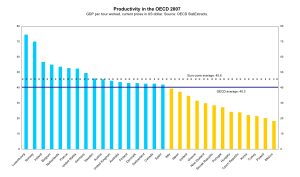 Image via Wikipedia
Image via Wikipedia"With the economy still in need of government life support and the future of American manufacturing in doubt, relying on faulty productivity data is a formula for disaster."
FOR a quarter-century, American economic policy has assumed that the keys to durable national prosperity are deregulation, free trade and a swift transition to a post-industrial, services-dominated future.
In reality, though, wage gains for the average worker have lagged behind productivity since the early 1980s, a situation that free-traders usually attribute to workers failing to retrain themselves after seeing their jobs outsourced.In 2009, the data show, Americans needed 40 percent fewer hours to produce the same unit of output as in 1980.
But there’s a problem: labor productivity figures, which are calculated by the Labor Department, count only worker hours in America, even though American-owned factories and labs have been steadily transplanted overseas, and foreign workers have contributed significantly to the final products counted in productivity measures.
The result is an apparent drop in the number of worker hours required to produce goods — and thus increased productivity. But actually, the total number of worker hours does not necessarily change.
This continuing mismeasurement leads economists and all those who rely on them to assume that recorded productivity gains always signify greater efficiency, rather than simple offshoring-generated cost cuts — leaving the rest of us scratching our heads over stagnating wages.
Because productivity gains in part reflect job offshoring, not just the benefits of technology or better business practices, then the American economy has been much less innovative than widely assumed.
Digging through the recession reasons, this seems to me one indicator that do not work. Another is so called "value added tax", useless here, useless in Grecian economy.
In reality, though, wage gains for the average worker have lagged behind productivity since the early 1980s, a situation that free-traders usually attribute to workers failing to retrain themselves after seeing their jobs outsourced.In 2009, the data show, Americans needed 40 percent fewer hours to produce the same unit of output as in 1980.
But there’s a problem: labor productivity figures, which are calculated by the Labor Department, count only worker hours in America, even though American-owned factories and labs have been steadily transplanted overseas, and foreign workers have contributed significantly to the final products counted in productivity measures.
The result is an apparent drop in the number of worker hours required to produce goods — and thus increased productivity. But actually, the total number of worker hours does not necessarily change.
This continuing mismeasurement leads economists and all those who rely on them to assume that recorded productivity gains always signify greater efficiency, rather than simple offshoring-generated cost cuts — leaving the rest of us scratching our heads over stagnating wages.
Because productivity gains in part reflect job offshoring, not just the benefits of technology or better business practices, then the American economy has been much less innovative than widely assumed.
Digging through the recession reasons, this seems to me one indicator that do not work. Another is so called "value added tax", useless here, useless in Grecian economy.
![Reblog this post [with Zemanta]](http://img.zemanta.com/reblog_b.png?x-id=e928b6cb-903f-47dd-8d68-e05a374fa2b8)
No comments:
Post a Comment